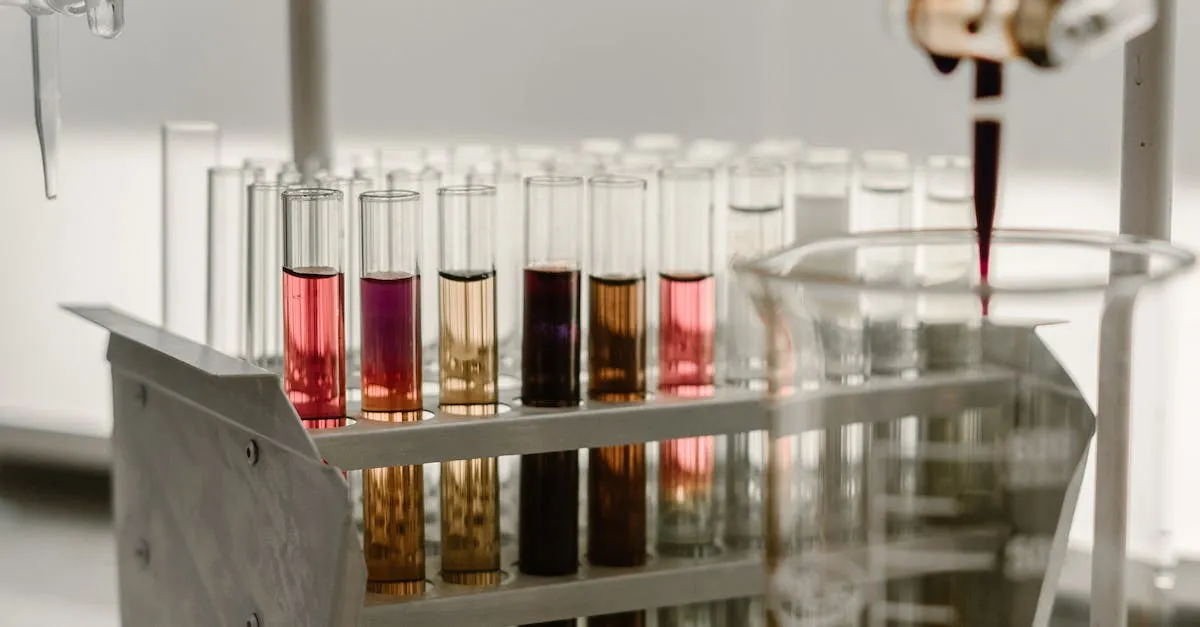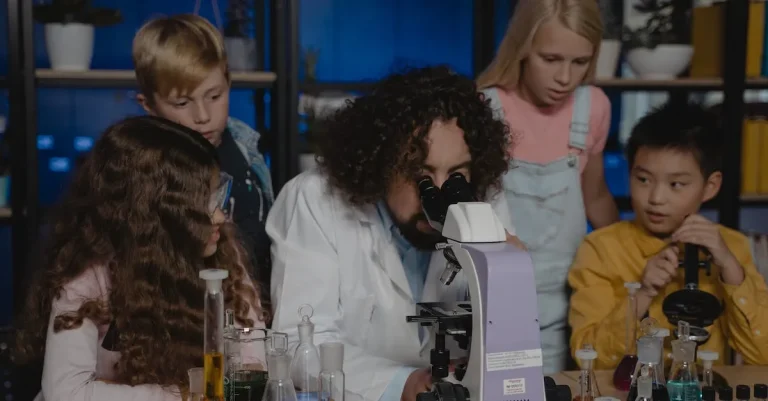Is Chemistry A Life Science?
Whether chemistry is considered a life science or a physical science is a topic of debate among scientists. At its core, chemistry is the study of matter and its transformations. However, the applications of chemistry have implications across many scientific fields, including the life sciences.
If you’re short on time, here’s the quick answer: Chemistry utilizes principles from both life sciences and physical sciences, but is primarily considered a physical science due to its focus on nonliving matter and energy.
However, chemistry principles are critical for understanding phenomena in biological systems, so there is significant overlap between chemistry and life sciences.
Defining the Life Sciences
The field of life sciences encompasses a wide range of scientific disciplines that focus on the study of living organisms, their structure, function, behavior, and interactions with their environment. One question that often arises is whether chemistry can be considered a life science.
To answer this question, it is important to understand the different branches of the life sciences and their areas of focus.
Biology
Biology is the branch of life science that deals with the study of living organisms, including their structure, function, growth, evolution, and distribution. It encompasses various sub-disciplines such as zoology, botany, microbiology, and genetics.
Biology examines the intricate processes that occur within cells, the organization and functioning of organs and organ systems, and the complex interactions between different organisms in ecosystems. While chemistry plays a crucial role in understanding biological processes, it is not the sole focus of biology.
Medicine
Medicine is another branch of life science that focuses on the diagnosis, treatment, and prevention of diseases and disorders in humans and animals. It combines principles from biology, chemistry, and other disciplines to develop a comprehensive understanding of the human body and its health.
While chemistry is an essential component of medicine, particularly in drug development and pharmacology, it is only one aspect of the broader field.
Ecology
Ecology is the study of how organisms interact with each other and with their physical environment. It explores the relationships between living organisms, their habitats, and the ecosystems they inhabit.
Ecologists investigate topics such as population dynamics, community structure, and the impact of human activities on the environment. While chemistry plays a role in understanding ecological processes, such as nutrient cycles and chemical interactions between organisms, it is not the primary focus of ecology.
Defining Chemistry and Its Branches
Chemistry is the scientific study of matter and the changes it undergoes. It plays a crucial role in our everyday lives, from the composition of the air we breathe to the materials we use in our homes.
Chemistry involves understanding the properties, composition, and behavior of substances and the transformations they undergo.
Inorganic Chemistry
Inorganic chemistry is the study of the properties and behaviors of inorganic compounds, which include minerals, metals, and nonmetals. It focuses on understanding the structure and properties of these compounds and how they interact with each other.
Inorganic chemistry is essential in many fields, such as materials science, environmental science, and medicine.
Organic Chemistry
Organic chemistry is the study of carbon-based compounds, which are the building blocks of life. It examines the structure, properties, composition, reactions, and synthesis of these compounds. Organic chemistry is crucial in fields like pharmaceuticals, biochemistry, and polymer chemistry.
Understanding organic chemistry is essential for drug development, as many drugs are organic compounds.
Physical Chemistry
Physical chemistry is the branch of chemistry that deals with the study of the physical properties and behavior of matter, as well as the energy changes that accompany chemical reactions. It combines principles of physics and chemistry to understand the fundamental laws governing chemical systems.
Physical chemistry is used in various fields, including materials science, environmental science, and energy research.
Biochemistry
Biochemistry is the study of chemical processes and substances that occur within living organisms. It focuses on understanding the chemical reactions and molecular interactions that drive biological processes. Biochemistry is crucial in fields like medicine, genetics, and nutrition.
It helps us understand how living organisms function at a molecular level.
For more information on chemistry and its branches, you can visit https://www.acs.org/ which is the official website of the American Chemical Society. They provide a wealth of resources and information about the field of chemistry.
Applications of Chemistry in Life Sciences
Applications in Biology
Chemistry plays a crucial role in the field of biology by helping researchers understand the composition and behavior of living organisms at a molecular level. One of the key applications of chemistry in biology is the study of biochemistry, which involves the analysis of the chemical processes and substances that occur within living organisms.
By understanding the chemical reactions and pathways that take place in cells, scientists can gain insights into how organisms function and develop new treatments for diseases.
Chemistry is also used in the field of genetics, where it helps researchers study the structure and function of DNA and RNA. Through chemical techniques such as polymerase chain reaction (PCR) and DNA sequencing, scientists can analyze and manipulate genetic material, allowing them to study the inheritance of traits and develop new methods for genetic engineering.
Furthermore, chemistry is essential in the study of pharmacology, where scientists use chemical compounds to develop new drugs and understand their effects on the human body. Medicinal chemists work on designing and synthesizing new compounds that can be used to treat diseases, while analytical chemists develop techniques for analyzing drugs and their metabolites in biological samples.
Applications in Medicine
The field of medicine heavily relies on chemistry for various applications. One of the key areas where chemistry is used is in drug development. Medicinal chemists utilize their knowledge of chemical compounds to design and synthesize new drugs that can effectively target specific diseases and minimize side effects.
Chemistry is also used in the formulation of pharmaceutical products, where chemists work on developing drug delivery systems that can enhance the absorption and effectiveness of medications.
Chemistry is also important in diagnostics and medical imaging. For instance, radiopharmaceuticals that are used in nuclear medicine rely on radioactive isotopes and chemical compounds to visualize and diagnose diseases such as cancer.
Additionally, chemical analysis techniques such as mass spectrometry and chromatography are used in clinical laboratories to identify and quantify substances in biological samples, aiding in the diagnosis and monitoring of various diseases.
Applications in Ecology
Chemistry plays a vital role in understanding and addressing environmental issues. Environmental chemists study the impact of pollutants on ecosystems and develop methods for monitoring and mitigating their effects.
They analyze the chemical composition of air, water, and soil samples to identify pollutants and assess their potential risks to human health and the environment.
Chemistry is also used in the study of biogeochemical cycles, which involve the movement and transformation of elements and compounds in the environment. By understanding the chemical reactions and processes involved in these cycles, scientists can better understand the impact of human activities on the environment and develop strategies for sustainable resource management.
Is Chemistry a Life Science or a Physical Science?
Chemistry is a field of science that encompasses both life sciences and physical sciences. While it is commonly classified as a physical science, it also plays a crucial role in understanding and explaining the processes of life.
Let’s explore why chemistry can be considered as both a life science and a physical science.
Focus on Nonliving Matter
One of the reasons why chemistry is often categorized as a physical science is its focus on nonliving matter. Traditional physical sciences, such as physics and astronomy, primarily study the behavior and properties of inanimate objects.
Similarly, chemistry examines the composition, structure, properties, and changes of substances, which includes both organic and inorganic compounds. By studying the behavior and interaction of atoms and molecules, chemists gain insights into the fundamental principles that govern the physical world.
Chemistry also plays a significant role in understanding the behavior of nonliving matter in biological systems. For example, biochemistry investigates the chemical processes that occur within living organisms, such as metabolism and enzyme reactions.
By studying the chemical reactions that take place in cells and tissues, biochemists can unravel the intricate mechanisms that drive life processes.
Principles Important for Life Sciences
Chemistry provides essential principles and concepts that are crucial for understanding the life sciences. It helps us comprehend the complex processes that occur within living organisms, including the formation of macromolecules, energy transfer, and the mechanisms behind biological reactions.
One area where chemistry plays a vital role in the life sciences is pharmacology. Understanding the chemical structure of drugs and their interactions with biological systems is essential for developing effective medications.
Medicinal chemists utilize their knowledge of chemical reactions and molecular properties to design and optimize drugs that target specific diseases or conditions.
Moreover, the study of chemical elements and compounds is fundamental in fields such as toxicology and environmental science. Toxicologists examine the effects of chemicals on living organisms, while environmental scientists investigate the impact of pollutants on ecosystems.
Both disciplines heavily rely on understanding the chemical properties and behavior of substances to assess their potential risks or benefits.
Conclusion
While debates continue on whether chemistry should be classified as a life science or physical science, there is no doubt that principles of chemistry are critical for understanding biological processes and systems.
The interdisciplinary nature of chemistry means it utilizes principles from both the life and physical sciences. Ultimately, chemistry’s focus on nonliving matter and energy qualifies it as a physical science, even though applications in biochemistry, medicine, and ecology have significant impacts across the life sciences.







